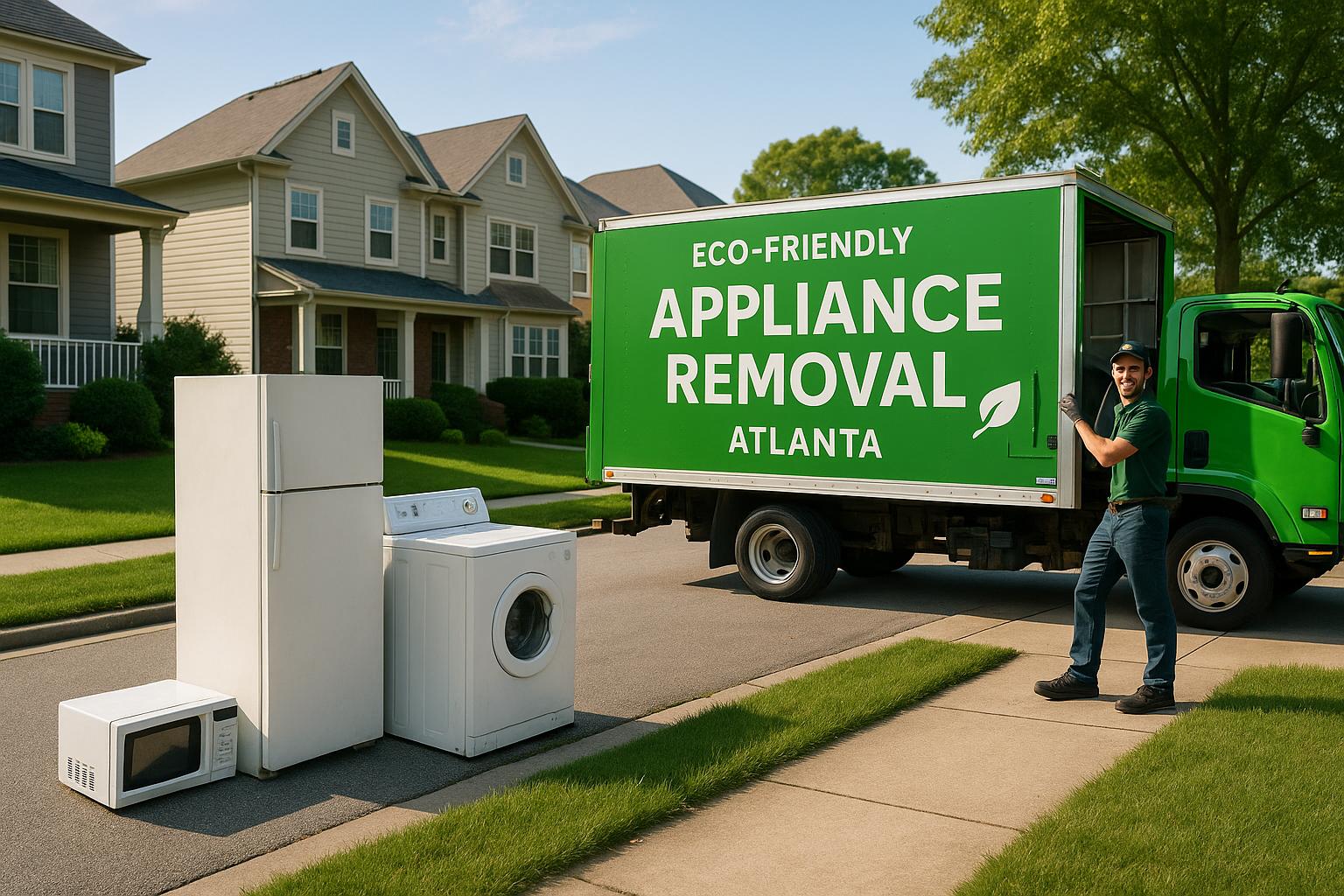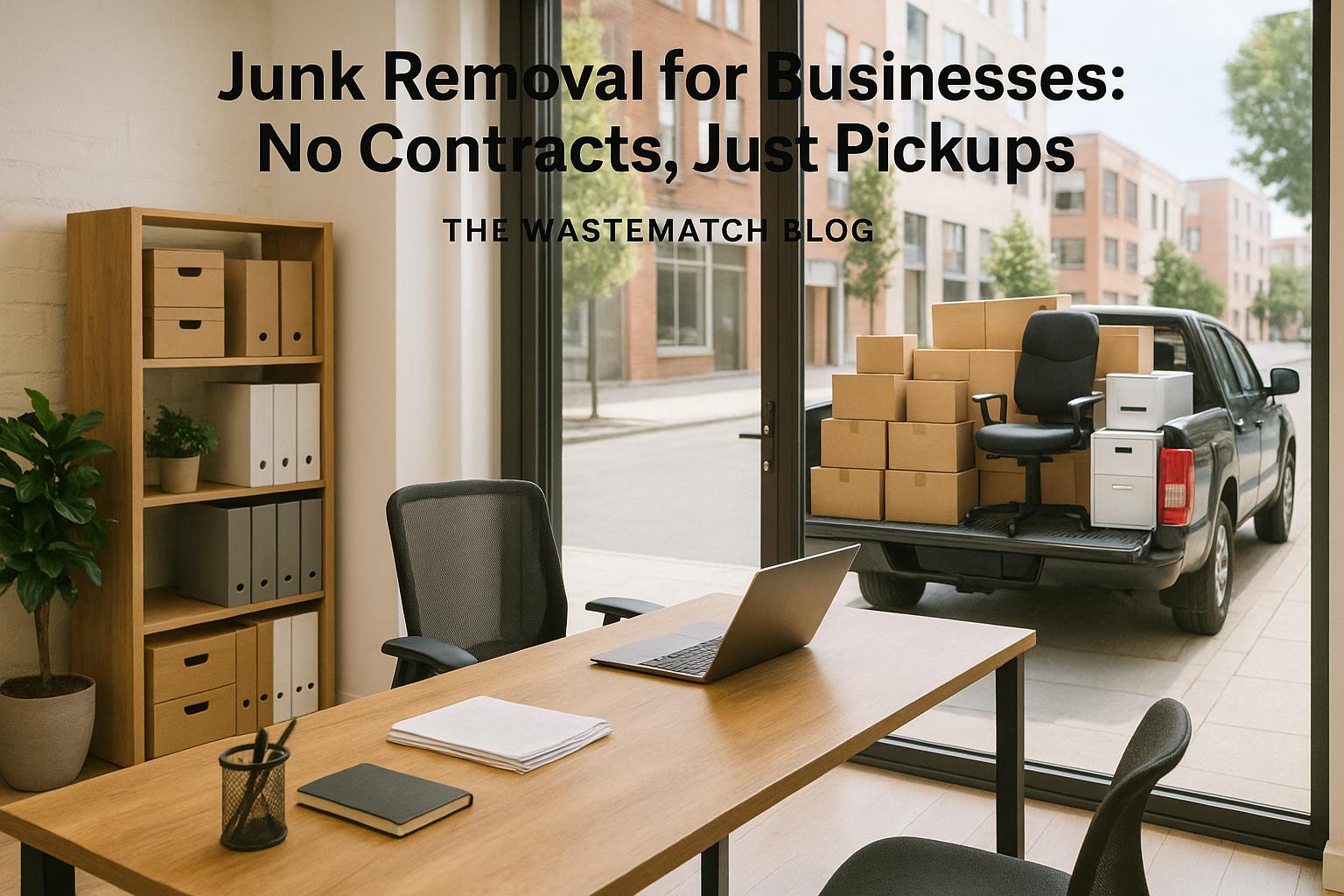Dealing with waste in Metro Atlanta just got pricier. Whether it’s cleaning out your garage or managing construction debris, understanding the updated 2025 dump fees can save you from unexpected costs. With annual residential waste collection now at $423.78 and commercial dumpster services climbing above $9,000, it’s more important than ever to plan ahead.
Here’s what you’ll learn:
- The factors driving higher fees (like material type and facility choice)
- How to calculate costs based on weight or volume
- Budget-friendly tips, like recycling or donating unwanted items
Don’t let higher costs catch you off guard. Let’s break it all down so you can manage waste smarter and keep your budget in check.
What Affects Dump Fees in Metro Atlanta
Knowing what influences dump fees in Metro Atlanta can help you plan your budget and sidestep unexpected expenses. Three key factors shape your disposal costs: the type of facility you use, the materials you’re getting rid of, and how the facility calculates its fees. Let’s break down how each of these elements impacts your final bill.
Facility Type
Where you take your waste plays a big role in how much you’ll pay. Different facilities have their own pricing structures and rules about what they’ll accept.
- Municipal Landfills: These facilities handle general waste and charge accordingly, but they often limit the kinds of materials they’ll take.
- Transfer Stations: These act as middle points, collecting waste before it’s sent to its final destination. For example, Cobb County’s transfer station charges residents $7 per ton for general waste, while non-residents pay a much steeper $50 per ton.
- Recycling Centers: Sorting your recyclables properly can save you money here. In Atlanta, recycling fees range from $30 to $100 per ton depending on the material. Taking the time to separate recyclables can lower your costs significantly.
Material Type
The type of waste you’re disposing of is another major factor in determining fees. Some materials are cheaper to dump than others, while certain types can be significantly more expensive.
- Household Waste: Standard household trash usually falls into regular pricing tiers.
- Construction and Demolition Debris: Materials like concrete, asphalt, and masonry are often priced higher because they’re heavy and charged by weight. Even small amounts of these dense materials can add up quickly.
- Recyclables: Properly sorted recyclables often come with lower fees, which incentivizes separating them from general waste.
- Hazardous Materials: Items like chemicals or electronics require special handling and disposal, which usually means higher fees. These materials often need to be managed through specialized services instead of regular waste facilities.
Disposal Method
How your waste is measured and billed also impacts your overall cost. Most facilities use either weight-based or volume-based pricing.
- Weight-Based Pricing: This method is common at landfills and recycling centers, where fees are calculated per ton. In Atlanta, landfill fees typically range from $50 to $150 per ton. Heavy items, like concrete or metal, can quickly drive up costs under this system.
- Volume-Based Pricing: Junk removal services often use this approach, charging based on the amount of space your waste takes up in their truck. For example, Georgia junk removal companies generally charge $75 to $125 for small loads (about 1–2 cubic yards) and $125 to $200 for quarter-truck loads (around 3–4 cubic yards). Bulky but lightweight items, like furniture, tend to cost more under this method.
Ultimately, your total disposal costs depend on a combination of these factors. By understanding how facility type, material type, and pricing methods work, you can make smarter choices and potentially save money on waste management.
Dump Fees by Facility Type
Let’s break down how fees vary across different types of waste facilities - municipal landfills, recycling centers, and transfer stations. Knowing these differences can help you better manage costs when disposing of waste. Below, we’ll dive into the pricing details and offer tips for each type of facility.
Municipal Landfills
Municipal landfills typically charge based on weight, though the rates can differ depending on the facility and the type of material you’re disposing of. Be sure to bring a valid ID, as many landfills require one, and expect your load to be inspected upon arrival.
These landfills are often a practical choice for getting rid of heavy materials like concrete, dirt, or other dense construction debris. However, it’s important to account for the extra time involved - traveling to the site, waiting in line, and unloading your materials can add up.
Recycling Centers
Recycling centers in Metro Atlanta can help you save money, especially if you take the time to sort your materials beforehand. To avoid additional charges, make sure recyclables are clean and properly separated.
Some centers go beyond basic recyclables and accept items like electronics and appliances, though there may be an added fee for these. Many also have special drop-off programs for specific items such as batteries or old appliances. It’s a good idea to call ahead to confirm what they accept and to check their current rates.
Transfer Stations
For mixed loads, transfer stations are a convenient option. Pricing often depends on whether you’re a resident of the area. Local residents may get discounted rates, while non-residents could face higher fees.
Transfer stations generally accept a wider variety of materials than recycling centers, though they may have more restrictions compared to landfills. They’re a great choice if you don’t want to sort your waste or make multiple trips to different facilities.
Up next, we’ll explore ways to calculate and cut down on these fees.
How to Calculate and Reduce Dump Fees
Take a close look at your waste bills on a regular basis to catch any unexpected charges that might be increasing your expenses. Some waste haulers tack on additional fees for things like compliance or operational costs, which can make an initially low price much higher in the end. WasteMatch helps by linking you with local haulers who provide clear, upfront pricing that’s easy to understand and compare. To take control of your costs even further, it’s helpful to understand how to calculate fees based on weight or volume. This knowledge can make a big difference in managing your waste expenses.
sbb-itb-c7714ed
Metro Atlanta Waste Disposal Rules and Best Practices
Local regulations in Metro Atlanta have a direct impact on waste disposal costs. By following proper disposal practices, you can manage these expenses more effectively while also supporting community efforts to improve waste management.
How Regulations Affect Dump Fees
Waste disposal fees in Metro Atlanta are influenced by strict environmental rules that facilities must follow. These regulations often result in additional charges for consumers. For instance, municipal landfills impose extra fees for unsorted loads and may penalize those who mix recyclables with general waste. Hazardous materials, due to the special handling they require, come with higher fees and potential fines.
Commercial entities face additional requirements, such as providing documentation for certain types of waste, like construction and demolition debris. Failing to provide this documentation can result in processing surcharges. These regulations highlight the importance of staying informed to avoid unnecessary costs.
Efficient Disposal Methods to Cut Costs
Recycling and donating items can significantly reduce disposal fees. Metro Atlanta has a well-developed recycling system that accepts materials like cardboard, metals, electronics, and textiles. Properly separating recyclables from general waste can help lower your overall costs, as mixed loads are often more expensive to process. Clean wood, metals, and cardboard, for example, are typically cheaper to handle and may even have resale value.
For organic waste, local composting programs offer an affordable alternative to landfills. Some programs even provide free or low-cost services compared to private facilities.
Another cost-effective option is donating items in good condition. Furniture, appliances, and other household goods that are still usable can be donated for free pickup, eliminating disposal fees and reducing transportation costs. This approach not only saves money but also benefits others in the community.
Tools to Simplify Waste Management
Several resources can make waste management more efficient. For instance, WasteMatch connects you with local haulers who can provide tailored, cost-effective solutions for your specific needs.
Municipal databases and public works tools are also valuable for identifying approved disposal facilities and understanding their fee structures and accepted materials. Many government agencies maintain online resources that simplify this process.
Businesses can take advantage of waste auditing tools to identify ways to reduce disposal costs through better sorting and recycling practices. Many commercial waste management companies offer free assessments to help businesses find cost-saving opportunities.
Next Steps for Metro Atlanta Waste Disposal
Now that we've delved into the factors and fee calculations, it's time to plan your waste disposal to avoid unexpected costs. Start by identifying the types of waste you have and align them with the most economical disposal options. This thoughtful approach ensures you stay within budget while managing waste efficiently.
Begin by sorting your waste into categories: household trash, recyclables, bulky items, yard debris, and hazardous materials. Proper sorting not only helps you choose the best disposal method but also prevents unnecessary fees.
For smaller cleanouts, take advantage of Atlanta's city services. Through Atlanta Solid Waste Services, you can schedule up to 12 free bulk item pickups annually, with each pickup handling two to three oversized items. This is a great way to save money while managing larger household items.
If your items are still in good condition, consider donating them. Local organizations like the Furniture Bank of Metro Atlanta, Goodwill of North Georgia, and Habitat for Humanity ReStore accept gently used furniture, appliances, and household goods. Not only does this eliminate disposal fees, but it also supports local community efforts.
For bigger projects, such as renovations or major cleanouts, renting a roll-off dumpster can make life easier. It simplifies the process by reducing the need for multiple trips and avoids the limitations of city pickup services.
If you prefer professional hauling services, platforms like WasteMatch can connect you with reliable local haulers in Metro Atlanta. WasteMatch provides upfront pricing so you know the cost before anyone arrives, offers flexible scheduling options (from same-day to next week), and ensures responsible disposal - whether through recycling, donation, or proper dumping - all in line with local regulations.
FAQs
What are some practical ways to lower waste disposal costs in Metro Atlanta with rising dump fees?
To cut down on waste disposal costs in Metro Atlanta, consider these straightforward strategies:
- Recycle as much as you can: Sorting out recyclable materials means less waste ends up in landfills, where disposal fees are typically higher.
- Opt for curbside pickup services: Many local programs offer convenient and often cheaper alternatives to hauling your own waste to a facility.
- Donate items in good condition: Instead of tossing usable goods, pass them along to charities or thrift stores where they can find a new home.
- Plan ahead for large-scale waste: Tackling big projects? Renting a dumpster or skip bin can save both time and money compared to multiple trips to a disposal site.
By paying attention to what you discard and exploring these cost-saving options, you can keep your waste management expenses in check, even as prices rise.
What are the benefits of using transfer stations instead of municipal landfills for waste disposal?
Transfer stations bring a host of benefits when compared to municipal landfills, making them a practical choice for waste disposal. One of the standout perks is their convenience. These facilities are typically located closer to neighborhoods and business districts, cutting down on travel time and saving on transportation costs. Plus, they’re perfect for handling smaller waste loads, making them a great option for individuals or businesses that don’t generate large amounts of trash.
Another advantage is how they simplify the waste management process. By gathering waste from various sources and transporting it in bulk to landfills or recycling centers, transfer stations make the entire system more efficient. This bulk transportation not only saves time but also reduces vehicle wear and tear by eliminating the need for frequent, long-distance trips to far-off landfills. It’s a smarter, more streamlined approach to handling waste.
How do regulations in Metro Atlanta affect the cost of disposing of hazardous materials?
Local rules in Metro Atlanta play a big role in determining the cost of disposing of hazardous materials. Often, these regulations come with extra fees or surcharges to ensure everything is handled safely and meets required standards.
For instance, items like paint, chemicals, or electronics may carry additional charges because they require specialized methods for safe disposal. To avoid any surprises, it’s a good idea to contact your local waste management facility and get details about specific fees. Being up-to-date on current regulations can help you budget better and handle disposal costs more efficiently.


